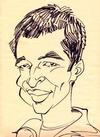Early days
Won a championship on the basketball team at his primary school in Brooklyn.
Was Captain of his cross-country team, winning a lot of races. In fact, he was so successful he was repeatedly talked aboutin the school’s yearbook the very next year despite having already graduated.
Early activism
Forced the class president at his James Madison High School to raise scholarship money for kids in Korea, after they had been orphaned due to the war there in the 1950’s.
Organized a sit-in against segregation when he was still a student in college. This was the first civil rights sit-in in Chicago history. This led to the University of Chicago investigating the discrimination just a week afterward.
Mayor of Burlington
Defeated the 5-term mayor of Burlington, winning by just ten votes in his bid against Democratic mayor Gorden Paquette. Hey, a win is a win. The odds were stacked against him. (Guma, The People’s Republic, pg. 42.)
He won re-election three times , defeating Democratic and Republican contenders.
Caused voter turnout to double during his tenure.
Burlington became the first city in the country to fund community-trust housing under Sanders’ leadership.
He not only balanced the city budget , but undertook ambitious downtown revitalization projects. He even helped bring in a minor-league baseball team to the town, the Vermont Reds.
He sued the town’s local cable franchise and won reduced rates for customers.
Kept a developer from turning important waterfront property into condominiums, hotels, and offices to be used only by the wealthy and affluent. Instead, it was made into housing, parks, and public space. Even today, the area still has many parks and miles of public beach and bike baths, including a science center.
Provided new firms with seed funding, and helped businesses create trade associations. He funded training programs to give women access to nontraditional jobs and even gave special attention to women wanting to become entrepreneurs.
Voted as one of America’s best mayors by U.S. News & World Report in 1987.
Teaching days
Taught political science at Harvard University’s Kennedy School of Government and Hamilton College.
U.S. House of Representatives
His 1990 victory was described by The Washington Post as being the “First Socialist Elected” to the United States House of Representatives in more than 40 years.
Served in the House from 1991 until the time he became a Senator in 2007. Over a span of 16 years, he continuously won re-election by large margins , with the only exception being 1994.
In his very first year in the House, he co-founded the Congressional Progressive Caucus. He led this group for its first eight years. Its primary devotion is to advance liberal causes and is currently the largest organization within the Democratic congressional caucus.
He sided with the minority in voting against the use of force against Iraq in 1991 and 2002. He also opposed the 2003 invasion of Iraq.
Voted against the Patriot Act despite the majority of Congress voting for it (357 to 66). He also sponsored several amendments trying to limit its effects, even getting a proposal passed through the House preventing the government from obtaining a record of the books people buy.
Was an open critic of Federal Reserve Chair Alan Greenspan and took him head on insisting he only represented “large and wealthy corporations.” Greenspan later admitted to Congress that his economic ideology regarding risky mortgage loans was flawed.
He passed more amendments than any other member during his time in the House. It earned him the nickname “The Amendment King.” He did this despite being a “socialist” and Congress being controlled by Republicans from 1994 to 2006, in one of the most partisan right-wing Houses ever.
Passed an amendment to “require offenders who are convicted of fraud and other white collar crime to give appropriate notice to victims and other persons in cases where there are multiple victims eligible to receive restitution.”
Passed an amendment that improved Postsecondary Education. It administered a competitive grant program to institutions of higher education seeking to reduce costs through the purchase of goods and services. This saved colleges and taxpayers both money.
He amended the Treasury and General Government Appropriations Act of 2003, stopping the IRS from being able to use funds that “violate current pension age discrimination laws.”
He expanded free health care and won a $100 million increase in funding by using his amendment powers. This added community health centers that gave out a variety of free health care services.
Prevented child labor by passing an amendment to a general appropriations bill. This stated that the U.S. will not appropriate funds for the importation of goods made by the hands of minors.
Won a $22 million increase for low-income home energy assistance and a related weatherization assistance program. This helped heat homes for the poor.
Passed an amendment that formed a bipartisan coalition effectively prohibiting the Export-Import Bank from handing out loans for nuclear projects in China.
U.S. Senate
Defeated a wealthy businessman, Rich Tarrant, to win his U.S. Senate seat in 2006, in one of the most expensive campaignsin Vermont’s history.
Received the distinction of being named the third-most popular senator in the country, according to Public Policy Polling in August 2011.
Given a score of 100 percent by the NAACP and NHLA (National Hispanic Leadership Agenda) based on his record during his time in the Senate.
Named one of the top 5 American Jews of the Forward 50 in 2015.
Chairman of the United States Senate Committee on Veterans’ Affairs in 2013-2014.
Became ranking minority member of the Senate Budget Committee in January 2015.
Became ranking minority member of the Subcommittee on Primary Health and Aging.
Passed an amendment making sure that solar water heaters provide at least 30 percent of hot water for new federal buildings. This is forcing us to use green energy.
Made sure to it that bailout funds weren’t used to replace laid-off U.S. workers with exploited and poorly-paid foreign workers.
Helped ensure that child care was being offered to parents in the Armed Forces by requiring the Comptroller General to provide accurate reporting on what was being done.
Required a public database be made available showing the names of senior Department officials seeking employment with defense contractors. This helped crack down on corruption.
Required that the TRICARE program provide treatment to veterans affected by certain types of autism. It wasn’t previously being done.
Won a battle requiring the Government Accountability Office to conduct an audit of the Board of Governors of the Federal Reserve System (the part that doesn’t interfere with monetary policy). This revealed the names of the recipients of over 2,000,000,000,000 in taxpayer assistance.
Was praised by John McCain(R-AZ) and Sen. Jack Reed(D-RI) for overhauling the Veterans Administration. Was said to have done such an excellent job of bringing all parties to a deal, that it wouldn’t have gotten done without Sanders’ work.
But, most of all, what Bernie has done is inspire Americans. That’s what he’s doing in this election. His list of accomplishments doesn’t include all the times he’s stood on the Senate floor giving a passionate speech on why the “big banks need to be broken up.” No, you can’t quite quantify things like that.
Here is one of the most inspiring videos of Bernie Sanders you will ever see:
Featured image via Facebook





















